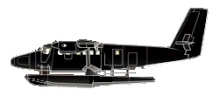
ASN Wikibase Occurrence # 321093
| Date: | Monday 11 July 2011 |
| Time: | 09:10 |
| Type: |  de Havilland Canada DHC-6 Twin Otter 310 |
| Owner/operator: | Trans Maldivian Airways |
| Registration: | 8Q-TMD |
| MSN: | 530 |
| Year of manufacture: | 1977 |
| Total airframe hrs: | 34746 hours |
| Cycles: | 62428 flights |
| Engine model: | Pratt & Whitney Canada PT6A-27 |
| Fatalities: | Fatalities: 0 / Occupants: 2 |
| Aircraft damage: | Substantial, written off |
| Category: | Accident |
| Location: | Biyaadhoo Training Lagoon -
 Maldives Maldives
|
| Phase: | Landing |
| Nature: | Training |
| Departure airport: | Malé International Airport (MLE/VRMM) |
| Malé International Airport (MLE/VRMM) | |
| Investigating agency: | AICC Maldives |
| Confidence Rating: |
A float-equipped de Havilland Canada DHC-6 Twin Otter sustained substantial damage in a heavy landing in Biyaadhoo Training Lagoon, Maldives. The two pilots on board were not injured.
The aircraft had departed from North bound left (NL) water runway of Male International Airport (MLE) at 08:20 local time for a routine training flight bound to Biyaadhoo Lagoon, the designated training area. The sky was clear with good visibility and wind 8-10 knots from west and south west.
During the training five landings and takeoffs were made simulating different conditions of flight. All these landings and takeoffs were made inside the lagoon except the last landing where the crew decided to land on open water outside the lagoon. The crew were simulating a tail wind/single engine landing.
As per the crew, the aircraft initial touch down was smooth. However, they stroke a wave which made the aircraft bounce foe about 20 feet. With the low power aircraft hit the water again with great impact, resulting multiple float attachments to break. Both front and main spreader bars broke and floats rose up, twisted and hitting the bottom engine cowlings. Propeller cuts were found on front of both floats. Also, the flaps as well as the flap selectors were found on the zero position.
CAUSAL FACTOR(S):
AICC determines that the probable cause(s) of the accident to be:
Impact with a high swell during landing followed by a high bounce and hard landing resulting in both float attachments being damaged and detached with major structural damages. Major contributing factor was higher than normal touch down speed due to abnormal landing configuration.
OTHER CONTRIBUTING FACTORS:
- Selection of inappropriate landing site (channel) and landing direction (tail wind) based on surface conditions present at that time.
- Simulation of multiple emergencies.
- Abnormal landing configuration (flaps at zero) for single engine landing.
- Time pressure to complete the training and return to commercial operations.
Accident investigation:
 |
|
Sources:
TMA seaplane crash-lands near Biyaadhoo resort (Haveeru, 11-7-2011)
Aviation authorities await seaplane crash report before considering safety review (Minivan News, 11-7-2011)
Location
Images:

photo (c) Werner Fischdick; Male International Airport (MLE/VRMM); 03 January 2001
Revision history:
| Date/time | Contributor | Updates |
|---|
The Aviation Safety Network is an exclusive service provided by:


 ©2024 Flight Safety Foundation
©2024 Flight Safety Foundation